
The Waterboys are a rock band formed in 1983 by Scottish musician and songwriter Mike Scott. The band's membership, past and present, has been composed mainly of musicians from Scotland, Ireland, Wales and England. Mike Scott has remained the only constant member throughout the band's career. They have explored a number of different styles, but their music is mainly a mix of folk music with rock and roll. They dissolved in 1993 when Scott departed to pursue a solo career. The group reformed in 2000, and continue to release albums and to tour worldwide. Scott emphasises a continuity between the Waterboys and his solo work, saying that "To me there's no difference between Mike Scott and the Waterboys; they both mean the same thing. They mean myself and whoever are my current travelling musical companions."
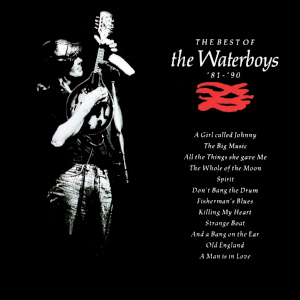
The Best of The Waterboys 81–90 is a compilation album by The Waterboys, released on 29 April 1991.
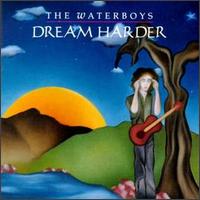
Dream Harder is the sixth studio album by the Waterboys, released by Geffen Records on 24 May 1993. Led by Scottish singer-songwriter-instrumentalist Mike Scott, the album features none of the earlier UK-based band members and instead finds Scott backed by American session musicians. It was the last Waterboys album before Scott spent seven years pursuing a formal solo career, with Bring 'Em All In (1995) and Still Burning (1997). The album reached position 171 on the Billboard Top 200 charts, surpassing the previous Waterboys album Room to Roam, in spite of a less-than-enthusiastic response from critics to the album's sound.

This Is the Sea is the third studio album by the Waterboys, released on 16 September 1985 by Ensign Records. The last of their "Big Music" albums, it is considered by critics to be the finest album of the Waterboys' early rock-oriented sound, described as "epic" and "a defining moment". It peaked at number 37 in the UK Albums Chart. Steve Wickham makes his Waterboys recording debut playing violin on "The Pan Within" and subsequently joined the band. This Is the Sea is the last Waterboys album with contributions from Karl Wallinger, who left the group to form his own band, World Party.

Fisherman's Blues is the fourth studio album by the Waterboys, released by Ensign Records in October 1988. The album marked a change in the band's sound, with them abandoning their earlier grandiose rock sound for a mixture of traditional Irish music, traditional Scottish music, country music, and rock and roll. Critics were divided on its release with some disappointed at the change of direction and others ranking it among the Waterboys' best work. The album was the Waterboys' best selling album, reaching a number 13 placing on the U.K. charts on release, and 76 on the Billboard 200.

Michael Scott is a Scottish singer, songwriter, and musician. He is the founding member, lead singer, guitarist and songwriter of rock band The Waterboys. He has also produced two solo albums, Bring 'Em All In and Still Burning. Scott is a vocalist, guitarist and pianist, and has played a large range of other instruments, including the bouzouki, drums, and Hammond organ on his albums. Scott is also a published writer, having released his autobiography, Adventures of a Waterboy, in 2012.
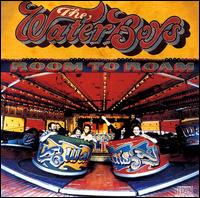
Room to Roam is the fifth studio album by the Waterboys, released by Ensign Records on 2 October 1990. It continued the folk rock sound of 1988's Fisherman's Blues, but was less of a commercial success, reaching #180 on the Billboard Top 200 after its release in October 1990. Critical response continues to be mixed. AllMusic describes it both as "not quite as [musically] successful" as Fisherman's Blues, but also as a "Celtic rock classic". The front and back covers were designed by Simon Fowler based upon photography by Stefano Giovannini and Sean Jackson.

Steve Wickham is an Irish musician. Originally from Marino, Dublin, but calling Sligo home, Wickham was a founding member of In Tua Nua and played violin on the classic U2 song "Sunday Bloody Sunday", as well as recordings by Elvis Costello, the Hothouse Flowers, Sinéad O'Connor, and World Party. He is a long-standing member of The Waterboys. Wickham plays both rock and roll and traditional Irish music, and has developed a rock music technique for violin he calls the "fuzz fiddle".

"The Raggle Taggle Gypsy" (Roud 1, Child 200), is a traditional folk song that originated as a Scottish border ballad, and has been popular throughout Britain, Ireland and North America. It concerns a rich lady who runs off to join the gypsies (or one gypsy). Common alternative names are "Gypsy Davy", "The Raggle Taggle Gypsies O", "The Gypsy Laddie(s)", "Black Jack David" (or "Davy") and "Seven Yellow Gypsies".

"Fisherman's Blues" is a song from folk rock band The Waterboys, which was released in 1988 as the lead single from their fourth studio album of the same name. It was written by Mike Scott and Steve Wickham, and produced by Scott. The song reached number 3 on the US Billboard Modern Rock Tracks chart, number 13 in Ireland and number 32 in the UK.
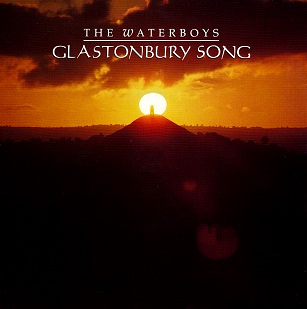
"Glastonbury Song" is a song by British band the Waterboys, released in July 1993 by Geffen Records as the second single from their sixth studio album, Dream Harder (1993). It was written by Mike Scott and produced by Scott and Bill Price. The song reached number 29 on the UK Singles Chart and number 12 on the Irish Singles Chart. The accompanying music video was directed by John Downer.

"Everybody Takes a Tumble" is a song from Scottish-Irish folk rock band The Waterboys, released as the only single from their ninth studio album Book of Lightning. It was written by Mike Scott and Anthony Thistlethwaite, and produced by Scott and Phil Tennant.
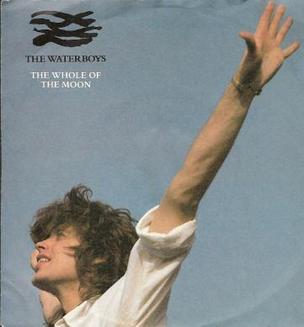
"The Whole of the Moon" is a song by Scottish band the Waterboys, released as a single from their album This Is the Sea in October 1985. It is a classic of the band's repertoire and has been consistently played at live shows ever since its release. Written and produced by Mike Scott, the subject of the song has inspired some speculation.

"How Long Will I Love You?" is a song by folk rock band the Waterboys from their fifth studio album, Room to Roam (1990). Written by Mike Scott, it was released as the album's lead single. The song was subsequently covered by English singer Ellie Goulding and released as the second single from her album Halcyon Days (2013). Goulding's version is included on the soundtrack to the 2013 film About Time, which also features a different cover by Jon Boden, Sam Sweeney and Ben Coleman.

Modern Blues is the eleventh studio album by the Waterboys, released on the independent label Harlequin and Clown in 2015. It was produced by Mike Scott, with two tracks being co-produced with Paul Brown. Modern Blues reached No. 14 on the UK Albums Chart and No. 2 on the UK Independent Albums Chart.
"A Life of Sundays" is a song by the Scottish-Irish folk rock band The Waterboys, which was released in 1990 as a track on their fifth studio album Room to Roam. It was written by Mike Scott and produced by Barry Beckett and Scott. In the United States, the song reached No. 15 on Billboard Modern Rock Tracks chart and remained on the chart for nine weeks.
"World Party" is a song by the Scottish-Irish folk rock band The Waterboys, released in 1988 as a track on their fourth studio album Fisherman's Blues. It was written by Mike Scott, Trevor Hutchinson and Karl Wallinger, and produced by Scott. In the United States, the song reached No. 19 on Billboard Modern Rock Tracks chart and remained on the chart for six weeks. It also peaked at No. 48 on Billboard's Album Rock Tracks chart.

In a Special Place – The Piano Demos for This Is the Sea is a compilation album by Scottish-Irish folk rock band The Waterboys. It was released in 2011 by Chrysalis and Capitol (US). The album reached No. 196 in the UK Top 200 Albums Chart.

"Don't Bang the Drum" is a song by British band the Waterboys, released as the opening track on their third studio album, This Is the Sea. It was written by Mike Scott and Karl Wallinger, and produced by Scott. The song was released as a single in Germany and was also issued as a 12" promotional vinyl in the United States.

















